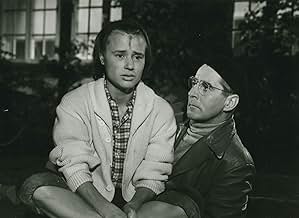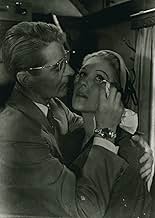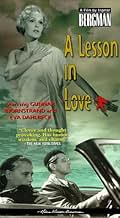IMDb रेटिंग
7.0/10
4 हज़ार
आपकी रेटिंग
अपनी भाषा में प्लॉट जोड़ेंAfter a 15-year marriage, the spouses are going to divorce, but suddenly find out that their feelings have not vanished yet.After a 15-year marriage, the spouses are going to divorce, but suddenly find out that their feelings have not vanished yet.After a 15-year marriage, the spouses are going to divorce, but suddenly find out that their feelings have not vanished yet.
Birgitte Reimer
- Lise
- (as Birgitte Reimers)
Georg Adelly
- Bartender
- (बिना क्रेडिट के)
Ingmar Bergman
- Narrator
- (बिना क्रेडिट के)
- …
Julie Bernby
- Guest at Wedding
- (बिना क्रेडिट के)
Henning Blanck
- Guest at Wedding
- (बिना क्रेडिट के)
Tor Borong
- Gentleman
- (बिना क्रेडिट के)
Yvonne Brosset
- Dancer in Bar
- (बिना क्रेडिट के)
Olle Ekbladh
- Guest at Wedding
- (बिना क्रेडिट के)
फ़ीचर्ड समीक्षाएं
Bergman is a sublime comedy director and writer. This fact becomes apparent in "En lektion I kärlek", where the comic elements range from pure slapstick to deep, yet very emotional scenes. This movie is paves the way for Bergman's later comedies "Sommarnattens leende" and "Kvinnodröm", all of them starring Gunnar Björnstrand as well as Eva Dahlbeck. This is an excellent movie with which to start your Bergman experience, acutely portraying emotional troubles of the young as well as the old. The cinematography by Martin Bodin is astounding, for instance in the picnic scene. In short, the movie is a perfect example of a successful comedy, with a clarity of depth even surpassing some of Bergman's own comedies.
The theme of "A lesson in love" is more or less the same as the theme of the "Pina Colada" song of Rupert Holmes (1979). A man and a woman have written off their marriage after 15 years and are both hunting for a new partner. During the hunt they rediscover each other.
As the theme already indicates the film has two types of scenes.
Scenes with respect to the worn out marriage (tragedy).
Scenes with both spouses (but primarily the man) on partner hunt (comedy).
As Bergman says at the beginning of the film: "This is a comedy that could have been a tragedy".
To be honest, the comedy element of this film is rather bad. It is old fashioned, over the top and maybe both. Only a year later Bergman would prove that he knows how to handle a comedy with "Smiles of a summernight" (1955).
With respect to the theme of the film the low quality if the comic scenes proves to be a blessing in disguise. Despite all the fights the family scenes are more sincere and even more hopeful than the flirtation scenes. After all to argue with someone means that you care for someone.
By the way, the real lesson in love is given by the grandparents. They show how to live with the imperfections of your partner without hurting his / her feelings or self esteem. They do so already 50 years.
As the theme already indicates the film has two types of scenes.
Scenes with respect to the worn out marriage (tragedy).
Scenes with both spouses (but primarily the man) on partner hunt (comedy).
As Bergman says at the beginning of the film: "This is a comedy that could have been a tragedy".
To be honest, the comedy element of this film is rather bad. It is old fashioned, over the top and maybe both. Only a year later Bergman would prove that he knows how to handle a comedy with "Smiles of a summernight" (1955).
With respect to the theme of the film the low quality if the comic scenes proves to be a blessing in disguise. Despite all the fights the family scenes are more sincere and even more hopeful than the flirtation scenes. After all to argue with someone means that you care for someone.
By the way, the real lesson in love is given by the grandparents. They show how to live with the imperfections of your partner without hurting his / her feelings or self esteem. They do so already 50 years.
Bergman really liked this reflecting back on summer thing, huh?
After Summer Interlude, Summer with Monika, and Wild Strawberries, it's a well he obviously found some merit in. Here we see it again in a story of a husband and wife taking a train to Malmo, Sweden (and then on to Copenhagen on a ferry) as they reflect back on their marriage.
Tonally, the movie has much more in common with Smiles of a Summer Night than the other three. It's a farce, through and through, and it's rather delightful. However, it's not really Bergman's strength, so while he makes the film entertaining and quite funny at times, he can't commit as fully to the concept as he might like. His instinct tend more towards darker ruminations, which ends up creating some tonal shifts that don't really help the movie at times.
And yet, the movie is still, largely, quite entertaining.
We begin with the dissolution of an affair between David and his lover, the much young Susanne. He's concerned that he's going to lose his family and that his wife will divorce him. The fight ranges from comic to very serious and ends with Susanne unhappily dumped. David, a gynecologist, skips out the rest of his day to catch a train. There he meets a man and a woman. The man, a salesman, bets David that he can kiss the woman before the next stop. After he gets a good slap, we remain with David and the woman and slowly realize through their bit of foreplay that the woman is David's wife, Marianne.
They go back and forth about whether their mutual affairs will continue and whether Marianne will divorce him or not. All through this, the two reflect back on different stages of their marriage, including memories around their children and his father. The memories move from extremely bitter (when Marianne discovered David and Susanne in a hotel together) to their happiest (just the mere summer before when they celebrated David's father's 73rd birthday together). As they spend time together, their memories become warmer towards each other.
The movie ends with a purely farcical display of David igniting Marianne's jealousy in a dingy bar by kissing a strange women (heavily implied to be a prostitute). A slap fight ensues and David drags her out. We see a really funny long shot as the two comically walk up and down a street, each trying to wrangle the other in their own ways. The very last shot is a cheeky moment as a cupid walks up to their hotel room and leaves a sign on the door that repeats the movie's title.
The movie really is quite amusing from beginning to end, but again, the tonal shifts that occur don't help the movie out. It's far from Bergman's best, but it really is quite delightful.
After Summer Interlude, Summer with Monika, and Wild Strawberries, it's a well he obviously found some merit in. Here we see it again in a story of a husband and wife taking a train to Malmo, Sweden (and then on to Copenhagen on a ferry) as they reflect back on their marriage.
Tonally, the movie has much more in common with Smiles of a Summer Night than the other three. It's a farce, through and through, and it's rather delightful. However, it's not really Bergman's strength, so while he makes the film entertaining and quite funny at times, he can't commit as fully to the concept as he might like. His instinct tend more towards darker ruminations, which ends up creating some tonal shifts that don't really help the movie at times.
And yet, the movie is still, largely, quite entertaining.
We begin with the dissolution of an affair between David and his lover, the much young Susanne. He's concerned that he's going to lose his family and that his wife will divorce him. The fight ranges from comic to very serious and ends with Susanne unhappily dumped. David, a gynecologist, skips out the rest of his day to catch a train. There he meets a man and a woman. The man, a salesman, bets David that he can kiss the woman before the next stop. After he gets a good slap, we remain with David and the woman and slowly realize through their bit of foreplay that the woman is David's wife, Marianne.
They go back and forth about whether their mutual affairs will continue and whether Marianne will divorce him or not. All through this, the two reflect back on different stages of their marriage, including memories around their children and his father. The memories move from extremely bitter (when Marianne discovered David and Susanne in a hotel together) to their happiest (just the mere summer before when they celebrated David's father's 73rd birthday together). As they spend time together, their memories become warmer towards each other.
The movie ends with a purely farcical display of David igniting Marianne's jealousy in a dingy bar by kissing a strange women (heavily implied to be a prostitute). A slap fight ensues and David drags her out. We see a really funny long shot as the two comically walk up and down a street, each trying to wrangle the other in their own ways. The very last shot is a cheeky moment as a cupid walks up to their hotel room and leaves a sign on the door that repeats the movie's title.
The movie really is quite amusing from beginning to end, but again, the tonal shifts that occur don't help the movie out. It's far from Bergman's best, but it really is quite delightful.
A trifling and predictable story, but cleverly presented in non-linear fashion (the gradual revelation of the identity of the female train passenger is ingenious), and further elevated by Bergman's silky direction and the dazzling, lively Eva Dahlbeck (her face is perfection). *** out of 4.
As time escapes before our eyes, the gulf from partners easily prised, distractions from all sides empower, the scent of meadow's other flowers. The grass is always greener there, far more lush to sup, devour, but once you've stepped over the stile, can you return, to reconcile.
David attempts to recover a lost link with his wife Marianne as their relationship has floundered and that link has disappeared, in not the best piece of storytelling from the maestro, although Eva Dahlbeck is always worth devouring wherever she performs and whatever she is in, and Gunnar Björnstrand was never too shabby either.
David attempts to recover a lost link with his wife Marianne as their relationship has floundered and that link has disappeared, in not the best piece of storytelling from the maestro, although Eva Dahlbeck is always worth devouring wherever she performs and whatever she is in, and Gunnar Björnstrand was never too shabby either.
क्या आपको पता है
- ट्रिवियाCameo: When the doctor (Gunnar Björnstrand) enters the train a tall lean man in a beret reading a newspaper is standing in the doorway. This is no one less than Ingmar Bergman himself.
- गूफ़During the conversation between David and his wife by the microscope, the shadow of the microphone can be seen on the wall for a large part of the scene.
- कनेक्शनFeatured in Stjärnbilder (1996)
टॉप पसंद
रेटिंग देने के लिए साइन-इन करें और वैयक्तिकृत सुझावों के लिए वॉचलिस्ट करें
- How long is A Lesson in Love?Alexa द्वारा संचालित
विवरण
- चलने की अवधि
- 1 घं 36 मि(96 min)
- रंग
- ध्वनि मिश्रण
- पक्ष अनुपात
- 1.37 : 1
इस पेज में योगदान दें
किसी बदलाव का सुझाव दें या अनुपलब्ध कॉन्टेंट जोड़ें



















